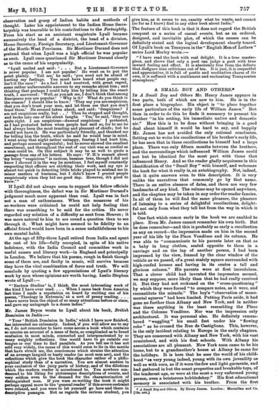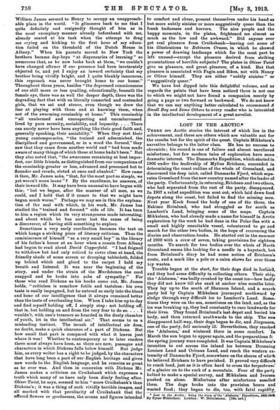A SMALL BOY AND OTHERS.*
IN A Small Boy and Others Mr. Henry James appears in two parts, both of which are new to him. He is in the first place a biographer. His object is " to place together some particulars of the early life of William James." But then in order to do this be finds it necessary to present his brother "in his setting, his immediate native and domestic air." How this is to be done without bringing in a good deal about himself it would be hard to say, and happily Mr. James has not avoided the only rational conclusion. Setting out to write his recollections of his brother's early life, he has seen that in these recollections he himself had a large place. There was only fifteen months between the brothers, and the surroundings which influenced William James could not but be identical for the most part with those that influenced Henry. And so the reader gladly acquiesces in this identification of the "Small Boy" with himself, and welcomes the book for what it really is, an autobiography. Not, indeed, that it quite answers even to this description. It is very unlike the narratives that commonly go by that name. There is an entire absence of dates, and there are very few landmarks of any kind. The volume may be opened anywhere, and the chapters may be taken in any order the reader fancies. In all of them he will find the same pleasure, the pleasure of listening to a series of delightful recollections, delight- ful not only from what they tell but from the way in which it is told.
One fact which comes early in the book we are enabled to place. Even Mr. James cannot remember his own birth. But he does remember—and this is probably as early a recollection as any on record—the impression made on him in the second year of his life by the Place Vendhme and its column. He was able to "communicate to his parents later on that as a baby in long clothes, seated opposite to them in a carriage and on the lap of another person, I had been impressed by the view, framed by the clear window of the vehicle as we passed, of a great stately square surrounded with high-roofed houses and having in its centre a tall and glorious column." His parents were at first incredulous. That a clever child bad invented the impression seemed, we may suppose, more likely than that he had really received it. But they had not reckoned on the " cross-questioning " by which they were forced "to compare notes, as it were, and reconstitute the miracle." The boy's "observation of monu- mental squares" had been limited. Putting Paris aside, it had gone no further than Albany and New York, and in neither was there anything in the least resembling the Place and the Colonne Yendiime. Nor was the impression only architectural. It was personal also. He definitely remem- bered " waggling " his small feet under his "flowing robe" as he crossed the Rue de Castiglione. This, however, is the only incident relating to Europe in the early chapters. They are concerned with Albany and New York, with his vast cousinhood, and with his first schools. With Albany his associations are all pleasant. New York soon came to be his home, but to a grandmother's house at Albany he came for the holidays. It is here that he sees the world of his child- hood "as very young indeed, young with its own juvenility as well as with ours, as if it wore the few and light garments, and had gathered in but the scant properties and breakable toys, of the tenderest age, or were at the most a very unformed young person, even a boisterous hobbledehoy." His first educational memory is associated with his brother. From the first • A Small Boy and Others. By Henry James. London : Macmillan and Co. [12s. net.]
William James seemed to Henry to occupy an unapproach- able place in the world. " It glimmers back to me that I quite definitely and resignedly thought of him as in the most exemplary manner already beforehand with me, already seated at his task when the attempt to drag me crying and kicking to the first hour of my educa- tion failed on the threshold of the Dutch House in' Albany." When his parents moved to New York the brothers became day-boys " at dispensaries of learning " so numerous that, as be now looks back at them, "we couldn't have changed oftener if our presence had been inveterately objected to, and yet I enjoy an inward certainty that my brother being vividly bright, and I quite blankly innocuous, this reproach was never brought home to our house." Throughout these years, besides " the depressed consciousness of our still more or less quailing, educationally, beneath the female eye, there was as well the deeper depth, there was the degrading fact that with us literally consorted and contended girls, that we sat and strove, even though we drew the line at playing with them and at knowing them, when not of the swarming cousinship at home." This cousinship "all unalarmed and unsuspecting and unembarrassed lived by pure serenity, sociability, and loquacity. . . . There can surely never have been anything like their good faith and, generally speaking, their amiability." When they met their young contemporaries, "the trained and admonished, the disciplined and governessed, or in a word the formed," they saw that they came from another world and " bad been made aware of many things of which those at home hadn't been." But they also noted that, "the awareness remaining at best imper- fect, our little friends, as distinguished from our companions of the cousinship greater or less, advanced and presumed but to flounder and recede, elated at once and abashed." How came it then, Mr. James asks, " that, for the most part so simple, we yet weren't more inane " ? By the excellence, he answers, of their inward life. It may have been unusual to have begun with this; "but we began, after the manner of all men, as we could, and I hold that if it comes to that we might have begun much worse." Perhaps we may see in this the explana- tion of the zeal with which, in his work, Mr. James has studied the " trained and formed " side of life. It has been to him a region which its very strangeness made interesting, and about which he has never lost the sense of being a discoverer, of having still something to explore.
Sometimes a very early recollection becomes the text on which hangs a striking piece of literary criticism. Thus the reminiscence of himself "as a very small boy" in the library of his father's house at an hour when a cousin from Albany had begun to read aloud David Copperfield. "I had feigned to withdraw but had only retired to cover close at hand, the friendly shade of some screen or drooping tablecloth, folded up behind which and glued to the carpet I held my breath and listened. It was near the beginning of the story, and under the strain of the Murdstones the cord snapped and he broke into sobs of sympathy." For those who read Dickens as his books came out, Mr. James holds, " criticism is somehow futile and tasteless : his own taste is easily impugned, but he entered so early into the blood and bone of our intelligence that it always remained better than the taste of overhauling him. When I take him up to-day and find myself holding off, I simply stop : not holding off, that is, but holding on and from the very fear to do so. . . . I wouldn't, with one's treasure- so hoarded in the dusty chamber of youth, let in the intellectual air." That seems to us a misleading instinct. The inrush of intellectual air does, no doubt, make a quick clearance of a part of Dickens. But how small that part is compared with what it leaves just where it was ! Whether to contemporary or to later readers there must always have been, as there are now, passages and characters in which Dickens falls below himself. But judge him, as every writer has a right to be judged, by the characters that have long been a part of our English heritage and given new words to the English language, and he remains as great as he ever was. And then in connexion with Dickens Mr•. James makes a criticism on Cruikshank which expresses a truth which many of us have only been dimly feeling after. Oliver Twist, he says, seemed to him " more Cruikshank's than Dickens's ; it was a thing of such vividly terrible images, and all marked with that peculiarity of Cruikshank that the offered flowers or goodnesses, the scenes and figures intended
to comfort and cheer, present themselves under his hand as but more subtly sinister or more suggestively queer than the frank badnesses and horrors. The nice people and the happy moments, in the plates, frightened me almost as much as the low and the awkward." Did anyone ever get real pleasure from Cruikshank—leaving out some of his illustrations to Robinson Crusoe, in which he showed a power of drawing landscape which for the most part he left unused—except the pleasure derived from striking presentations of horrible subjects ? The plates in Oliver Twist give us pleasure, and great -pleasure, of a kind. But that pleasure is associated with Fagin and Sikes, not with Nancy or Oliver himself. They are either "subtly sinister" or "suggestively queer."
We have but dipped into this delightful volume, and as regards the points that have been noticed there is not one to which we might not have found a companion merely by going a page or two forward or backward. We do not know that we can say anything better calculated to recommend A Small Boy and Some Others to every reader who is interested in the intellectual development of a great novelist.



















































 Previous page
Previous page